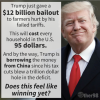hanimmal
Well-Known Member
https://apnews.com/article/virus-ou...hive-economy-27e0605143f2698dc570b927443c5e3d


https://fred.stlouisfed.org/series/...medium=widget&utm_campaign=fred-glance-widget
WASHINGTON (AP) — Federal Reserve officials expressed concern at their most-recent meeting that the U.S. economy recovery could falter if Congress failed to approve another round of pandemic relief.
The Fed on Wednesday released minutes of its most recent meeting, showing that officials believed the economy was growing faster than expected.
But they based their forecasts of a further steady recovery on expectations that Democrats and Republicans would resolve their differences and provide further economic aid, including expanded unemployment benefits and help for small businesses.
The minutes said that “most forecasters were assuming that an additional pandemic-related fiscal package would be approved this year, and noted that, absent a new package, growth could decelerate at a faster-than-expected pace in the fourth quarter.”
Economists noted the minutes delivered a dual message of satisfaction that so far the recovery is progressing better than expected but also continued concerns that the outlook could quickly darken without further government support.
Curt Long, chief economist for the National Association of Federally Insured Credit Unions, said the minutes showed Fed officials have “serious concerns over cuts to fiscal support.”
The prospects for approval of a new congressional package being passed before the Nov. 3 elections, however, have significantly diminished with President Donald Trump’s decision to cut off negotiations with Democrats. Trump has instead proposed that Democrats approve individual rescue items, such as money for ailing airlines and another round of $1,200 checks for most adults, rather than a comprehensive aid package.
Federal Reserve Chairman Jerome Powell warned in a speech Tuesday of potentially tragic consequences if Congress and the White House do not provide further assistance, saying “the expansion is far from complete.”
The minutes covered the Fed’s Sept. 15-16 meeting in which officials left their key policy rate unchanged at a record low near zero and signaled that they expected to keep rates at ultra-low levels at least through 2023.
The Fed’s statement incorporated a policy change the central bank announced in August in which it will allow inflation to rise above its 2% target for a period of time to make up for the extended period over the past decade that annual inflation has been below the 2% target. That change is seen as allowing to keep interest rates lower for a longer period.
The September statement was approved on a 10-2 vote, with Dallas Fed President Robert Kaplan dissenting because he favored less precise policy guidance in terms of inflation. Minneapolis Fed President Neel Kashkari dissented because he wanted the Fed to make a bolder statement about the change in operations regarding inflation.
The minutes recognized large problems in trying to forecast the future path of the economy.
“Participants continued to see the uncertainty surrounding the economic outlook as very elevated with the path of the economy highly dependent on the course of the virus, on how individuals and businesses and public officials responded to it and on the effectiveness of public health measures to address it,” the minutes said.
https://fred.stlouisfed.org/series/...medium=widget&utm_campaign=fred-glance-widget









